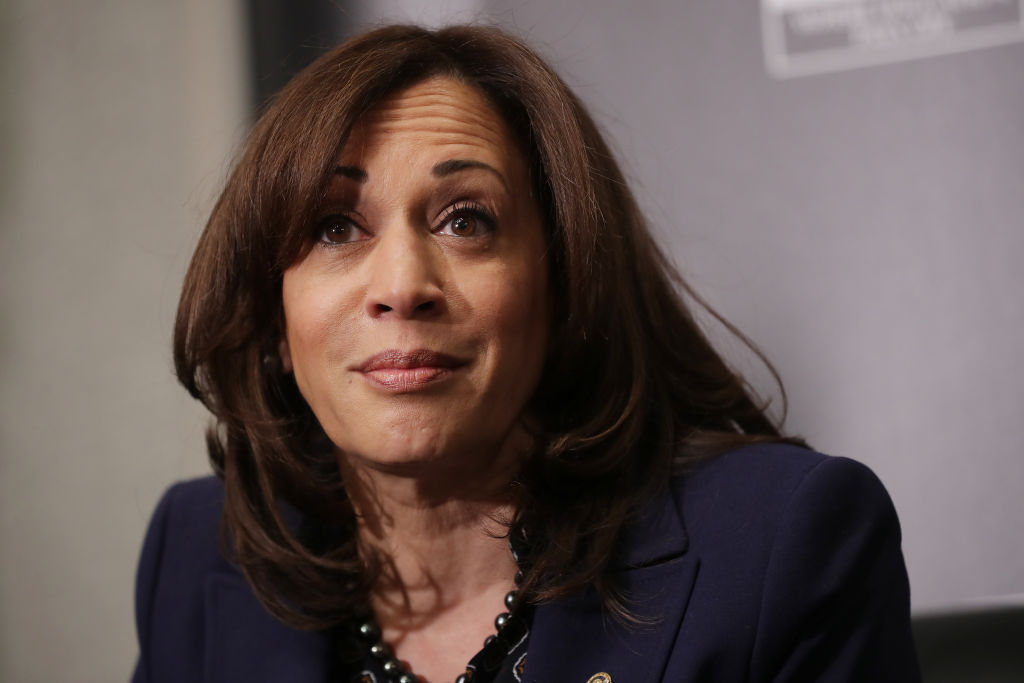
Source: Chip Somodevilla / Getty
Unpopular opinion: Senator and presidential hopeful Kamala Harris (D-CA) might be Black, but she is not Black-Black.
Fight me.
But before you armor up, let me say first that I am well-aware of the fact that Harris is a product of a Tamil Indian and Jamaican union. I know that her Indian mother identified as Black and raised her Black daughters in Oakland, Calif. I am also aware that Harris is a graduate of Howard University and is a member of the Black Greek organization Alpha Kappa Alpha Sorority, Incorporated.
But she is also a prosecutor in the man’s criminal justice system with what some would call a very questionable prosecutorial record. And she has a white husband. His name is Doug.
How could you fault me if I have questions?
And I am not the only one. In fact, Harris’ Black Card has become such a hot topic that she even addressed questions about it during a recent interview with The Breakfast Club (see at the 11-minute mark):
Listen, I am no fan of any kind of policing, especially by the color unit who likes patrols the streets with brown paper bags ready to take down anyone who doesn’t match up. Sincerely, if she identifies as Black, and she looks Black, who am I to doubt her? With that said, I’m not going to pretend like her biological Blackness is the only thing that matters.
That’s right: blackness is not just skin deep.
If Blackness were just about color, Harris’ team wouldn’t be circulating video of the candidate putting herself through what appears to be some excruciating pain while Cardi B plays in the background:
Well, that’s how it looked to me anyway.
Listen Linda, I know this all sounds a little bit confusing, if not counterproductive, especially when our supposed aim in this country is to get away from being judged based on the color of our skin. But if it helps, you can do what I do and think of blackness in three parts.
First, there is ethnic blackness, which basically means you were born into it.
Next is cultural blackness, which includes traditions, language, and of course, cultural contributions usually associated with Black people and Black life.
And finally, there is political blackness, which relates to the political work one does to dismantle this nation’s anti-racist or anti-Black policies that have inflicted state violence on anyone with dark skin.
The idea of political blackness is nothing new and has been an acceptable form of political discourse in other parts of the world where Black folks, and other people of color, live under the oppression of white supremacy. For instance, in the UK, historically, British Indians, Africans, Afro-Caribbeans and Pakistani people mostly vote together in the hopes of dismantling a system that oppresses them all, but Black people the most.
While this remains a foreign concept stateside, politicians in America have long relied on cultural blackness to appeal to voters. In most recent times it was when Bill Clinton played the saxophone on The Arsenio Hall Show. Or when Hilary Clinton would declare that she too, like Beyoncé, kept hot sauce in her purse.
And when, to some extent, Barack Obama came on the scene.
You can say what you will, but Barack’s entire capital in the Black community, if you will, comes less from his biological identity and more from his social and political one.
Just like Harris, the former POTUS too had to prove his blackness.
And for good reason. He was a virtual stranger to the Black community even as his star was steadily rising on the national political scene. In fact, very few Black leaders would vouch for him, including long-time activist and Chicago resident Jesse Jackson, who in the process of stumping for the soon-to-be president, was caught on a hot mic threatening to “cut his nuts out.”
And just like Harris, there was nothing politically remarkable about him. He talked, walked and gestured his hands around while giving DNC-approved talking points, just like any other bland senator on the Hill. His garden variety campaign promise of being the “Change We Need,” a president for all of America, was probably one of the reasons many Black politicians originally refused to endorse him when he first announced his presidency, instead opting to go with Clinton, a longtime community ally.
By all accounts, Obama’s campaign should have been dead in the water before it even began, but we all got a chance to meet his family. Specifically, we were introduced to his wife, Michelle Obama.
Born and raised on the South Side of Chicago, there was nothing ambiguous about Michelle’s blackness. And the fact that he had a bonafide Black woman by his side provided voters with a level of comfortability that he would not have received by marrying a white woman. It was an assurance that this strange Black guy with nontraditional Black roots didn’t stray too far down the anti-Black road. He was one of us.
Granted, its not a fool-proof method. And unfortunately, for Harris, she does not have the benefit of a Black family to boost up her blackness points within the community. Nor is she the first Black person in line for the office, which would give voters the opportunity to overlook her cultural shortcomings.
Instead, those like myself who question her blackness can only rely on how she presents herself politically. And with a questionable prosecutorial record and no platform thus far aimed specifically at the Black community, it’s hard to see how committed or aligned with Black folks Harris really is.
Some might say its not fair to judge her that way, but in America, where race is still very much an issue, why shouldn’t Black voters consider a candidate’s relationship to blackness?









